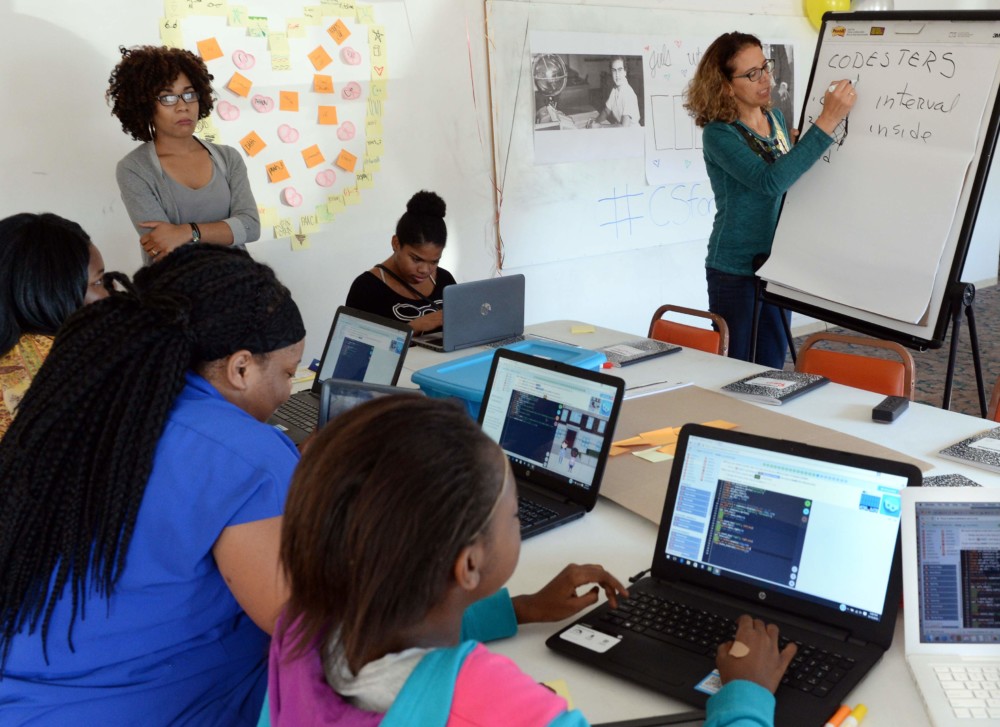By Ryan Quinn
The Charleston Gazette-Mail, W.Va.
WWR Article Summary (tl;dr) In 2015, only 22 percent of students taking the AP Computer Science exam were girls, and only 13 percent were African-American or Latino students. A West Virginia tech initiative is attempting to change those statistics with an innovative program that includes free coding classes.
The Charleston Gazette-Mail, W.Va.
With a shout out from the White House, the efforts to teach computer coding to more Kanawha County girls expanded Wednesday, with plans for an initiative that started with just female students to further grow and, eventually, expand beyond women and Kanawha’s borders.
Ysabel Bombardiere, the volunteer instructor for a girls coding group that started early this year at the West Virginia University Extension Service office in Kanawha City, said she’s started a new initiative, called Project Code Nodes, that will add — atop the Kanawha City group, where a new session of meetings started last month — three new free coding groups based in downtown Charleston, Institute and Rand.
On Wednesday, the Institute class became the first new one to open. Bombardiere said the downtown Charleston group is expected to start this fall and the Rand group is planned to begin in January.
Bombardiere’s classes will continue to receive support from the New York City-based nonprofit Girls Who Code, and all the new locations are affiliated with the Partnership of African American Churches, whose executive director, James Patterson, said is a group of about 21 churches, all in the Mountain State.
He said the Institute class will be held at Institute Church of the Nazarene, which he pastors, while the downtown Charleston group will be at the Martin Luther King Jr. Community Center and the Rand group will be at Levi First Missionary Baptist Church.
NASA’s West Virginia Space Grant Consortium — a group of a dozen West Virginia academic institutions and eight corporate and scientific partners that includes science, technology, education and mathematics education in its mission — provided three college students who are NASA fellows to aid with the coding classes.
Bombardiere said it is hoped that 4-H workers and the fellows will be able to learn enough to teach more classes on their own, to eventually expand the program and achieve her goals of teaching boys and girls coding and robotics. Right now, she’s the only instructor for the four locations.
She said the four locations should be able to provide the free computer coding classes to 70 girls overall.
All middle- or high-school female students of all races who are interested in coding, whether affiliated with the Partnership of African American Churches’ other existing programs or not, are welcome to sign up for the classes. Those interested can call the Partnership of African American Churches, at 304-768-7688. Those involved with Project Code Nodes said they didn’t receive new funding for the initiative, and donors interested in giving can call the same number.
Bombardiere said girls are encouraged to bring their own laptops — she said Kanawha school system-issued tablet computers won’t work for the classes — and said if a participant doesn’t have a laptop, the program will work to provide one for her.
She said the expansion and collaboration with the Partnership of African American Churches came in response to obstacles in getting girls to Kanawha City.
“Transportation is a barrier for a lot of families,” she said, “so having community-based clubs increases the access.”
She noted the Partnership of African American Churches locations where the new classes will be held already are community centers that students already attend for after-school, free food, summer programs or church programs.
“It’s another thing for them to do in their community that is free and they don’t have to travel or get a ride from somebody to go,” she said.
Project Code Nodes was highlighted by the White House Wednesday as part of a summit on President Barack Obama’s Computer Science for All initiative. Among other things related to the initiative, Obama is calling on Congress for $4 billion in funding for states and $100 million directly for school systems “to expand K-12 [computer science] by training teachers, expanding access to high-quality instructional materials, and building effective regional partnerships,” according to the initiative’s website.
A White House statement on the initiative released Wednesday credited West Virginia as one of a dozen states that have taken “concrete policy actions” to support computer science education since Obama highlighted the need for it in his final State of the Union speech. In April, the state Board of Education approved a policy revision that, starting this school year, mandates that all public high schools offer optional computer science classes.
“In 2015, only 22 percent of students taking the AP Computer Science exam were girls, and only 13 percent were African-American or Latino students,” the Computer Science for All website states. “These statistics mirror the current makeup of some of America’s largest and more innovative tech firms in which women compose less than one-third of their technical employees, and African-Americans less than 3 percent.”
Edna Green, the director of the Partnership of African American Churches’ after-school programs, said the initial session of the Institute group will run from now through March, with hour-long meetings twice a week, and the downtown Charleston group’s initial session will run from October through April, with hour-long meetings twice a week. She said the Rand group’s initial session will launch in January and run through the end of the school year in May, with two-hour-long meetings once a week.














































































































































































































































































































































































